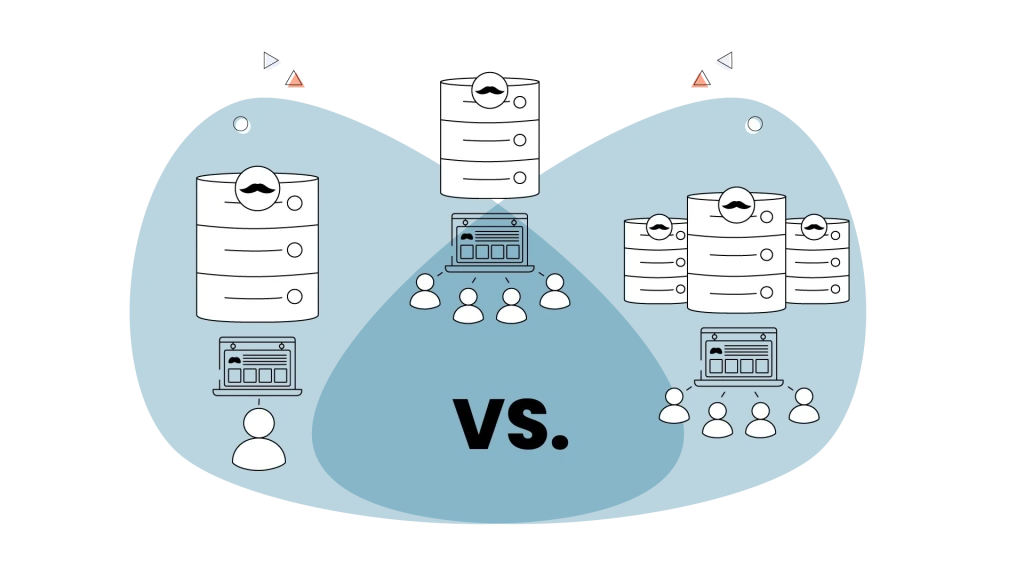Web hosting is a service that lets you serve your own website on the internet. If you’re a small business with a website, you can sell to your customers online and leverage SEO to increase your customer base, as we’ve seen in many blogs on HostPapa. As a freelancer, your website can be a great resource for your portfolio.
Choosing the right web hosting provider is the first logical step in the process.
- What Is Simple (Shared) Web Hosting?
- What Is VPS Hosting?
- What Is Dedicated Hosting?
- Dedicated Hosting vs VPS Hosting vs Shared Hosting: A Detailed Comparison
- Why Choose HostPapa for Your Hosting Needs?
- How to Choose the Right Web Hosting for Your Website

What Is Simple (Shared) Web Hosting?
Shared hosting is often the first step many take into the world of web hosting, and for good reason. It’s the most budget-friendly way to get your website online. But what exactly does “shared” mean in this context, and is it the right fit for your business needs?
This type of hosting means your website resides on a server alongside other websites. These can be WordPress websites or those based on custom code, and most web hosts accompany this with a free domain for one year or more.
It’s an entry-level service where everyone shares server resources, keeping costs low. Perfect for new projects and basic websites.
How Shared Hosting Works: Pooling Resources
Multiple websites share a single server’s CPU, RAM, and disk space. The hosting provider manages all server maintenance, updates, and security. You focus on your site, not server administration. This multi-tenant setup is why it’s so affordable.
Advantages of Shared Hosting
- Most cost-effective option: The lowest hosting cost, perfect for tight budgets.
- User-friendly and easy to manage: Great for beginners. Usually includes a simple control panel (like cPanel); no tech skills needed.
- Sufficient for new websites and small blogs: Ideal for sites with low to moderate traffic.
Limitations of Shared Hosting
- “High traffic neighbours” and performance: High traffic or resource use by another site on the server can slow yours down.
- Resource constraints: Fixed limits on system resources. Growth or traffic spikes can cause issues or require an upgrade.
- Limited control and customization: Less control over server settings and software.
- Basic security: Relies on the provider’s server-wide security, like a free SSL certificate and some degree of automatic backups; you also have a shared IP address.
Is Shared Hosting Right for You?
Choose shared hosting for personal websites, new blogs, startups with small budgets, or testing ideas. It’s best for low-traffic sites where affordability and ease of use are key.

What Is VPS Hosting?
When shared hosting isn’t enough, VPS (Virtual Private Server) hosting offers a significant upgrade in performance, control, and even more resources, without the need to go to a dedicated server, yet.
Tip: A great alternative to VPS could be Managed WordPress Hosting provided by HostPapa, with the option to host more than one website on the same account.
If your website runs on WordPress, Managed WordPress Hosting offers a specialized environment built for speed, security, and ease of use. It takes the guesswork out of optimizing your WordPress site, providing a robust platform packed with benefits.
The vast majority of growing businesses (small and medium businesses more often), though, will appreciate the many benefits of VPS hosting.
VPS Hosting: Your Own Virtual Server
A VPS is a virtual machine sold as a service. One physical server hosts multiple isolated virtual servers. Each VPS has its own dedicated resources (CPU, RAM) and operating system, acting like a private server.
How VPS Hosting Works: The Power of Virtualization
Virtualization technology divides a physical server into several independent virtual servers. Though on the same physical machine, each virtual private server is isolated, meaning other users don’t directly impact your performance or security.
Benefits of VPS Hosting
- Guaranteed resources: Your allocated CPU, RAM, and storage are yours alone. No more “noisy neighbours.”
- Improved performance and reliability: Faster speeds and better stability than shared hosting.
- Greater scalability: Easily upgrade resources (CPU, RAM, storage) as your business grows, often with minimal downtime.
- Enhanced control (root access): Install custom software and configure your server environment with root access.
- Better security: Isolation from other users means improved security. You can also install custom security tools.
Common Use Cases for VPS Hosting
- Growing online businesses and eCommerce stores need reliability.
- Websites with increasing, moderate traffic outgrowing shared plans.
- Developers need specific server configurations or software.
- Hosting multiple smaller websites under one controlled and dedicated environment.

What Is Dedicated Hosting?
For maximum performance, security, and control, dedicated hosting is the top-tier solution. You get an entire physical server exclusively for your website or application.
Dedicated hosting gives you an entire physical server just for your use. All its resources—CPU, RAM, storage, bandwidth—are 100% yours. This means peak computing power and customization. We’ve talked about the benefits of HostPapa Dedicated Server Hosting in our introductory article on our blog.
How Dedicated Hosting Works: No Sharing, All Yours
One server, one client. You lease the entire machine. This guarantees all processing power, memory, and connectivity are dedicated to your applications, ensuring optimal performance.
Τhe Advantages of Dedicated Hosting
- Maximum performance and speed: Unmatched speed with no resource contention. Critical for demanding sites.
- Full control (root access): Complete freedom to customize your server, OS, and software.
- Top-tier security and isolation: The highest level of security through physical isolation and custom configurations.
- Unrivalled reliability and uptime: Your site isn’t affected by others, leading to excellent stability.
- Handles high traffic and intensive apps: Perfect for large databases, streaming, gaming, or massive traffic.
Ideal Scenarios for Choosing Dedicated Hosting
- Large eCommerce sites and enterprise-level applications.
- Resource-heavy apps need significant processing power or memory.
- Websites with strict security or compliance needs (e.g., HIPAA, PCI).
- High-traffic portals, busy forums, game servers, or media streaming.
Dedicated Hosting vs VPS Hosting vs Shared Hosting: A Detailed Comparison
With so many options available, it’s easy to get lost in the details. To help you quickly understand the key differences between Shared, VPS, and Dedicated hosting, we’ve put together a straightforward comparison.
This table highlights key aspects like:
- Resource allocation
- Hosting performance
- Security
- Customization and control
- Scalability
- Cost
- Ideal user/business type
| Feature | Shared Hosting | VPS Hosting | Dedicated Hosting |
| Resource Allocation | Shared among many users | Dedicated virtual resources | Entire physical server is dedicated |
| Hosting Performance | Basic, performance can vary | High, reliable | Superior, consistent |
| Security | Basic | Improved isolation | Maximum isolation and security |
| Customization | Limited | Moderate | Full control |
| Scalability | Limited | Easily scalable | Manual hardware upgrades |
| Cost | Most affordable | Mid-range | Premium pricing |
| Best For | Small blogs, startups | Growing businesses, developers | Large enterprises, high traffic |
1. Hosting Performance: Why Speed & Uptime are Non-Negotiable
Site performance is crucial. Slow speeds or downtime hurt your business by impacting:
- SEO and rankings: Faster sites rank better.
- User experience (UX): Slow sites make visitors leave.
- Conversion rates: Speed boosts engagement and sales.
Dedicated Hosting: The Performance King
With no shared resources, dedicated hosting delivers optimal speed and responsiveness. All server power is yours, ensuring peak performance even under heavy load.
VPS Hosting: Balanced Performance for Growth
VPS offers reliable, consistent performance thanks to its dedicated virtual resources. It’s a significant step up from shared hosting, providing a good balance of power and cost-efficiency for growing sites.
Shared Hosting: Performance for Simpler Needs
Shared hosting provides adequate performance for new or low-traffic websites. However, be aware that resource sharing can lead to slower speeds during peak times or if other sites on the server are busy.
2. Security Considerations: Protecting Your Digital Assets
Website security is paramount. A breach can damage your reputation, lead to data loss, and erode customer trust. Each hosting type offers different levels of security:
Dedicated Hosting: Fortress-Level Security
Enjoy maximum security with physical server isolation. You get a dedicated IP address and full control to implement custom, advanced security configurations and firewalls, ideal for sensitive data.
VPS Hosting: Enhanced Security Through Isolation
VPS provides strong security due to its virtual isolation from other users on the same physical server. You can often install custom security software and configure firewalls, offering significantly better protection than shared hosting.
Shared Hosting: Understanding the Risks
Shared hosting provides basic security managed by the provider. The main risks come from the shared environment; if one site is compromised, it can potentially (though rarely with good providers) affect others. You also typically share an IP address.
3. Scalability & Flexibility: Planning for Future Growth
Your hosting should support your website’s growth, not hinder it. Consider how easily you can upgrade resources as your traffic and needs expand:
VPS Hosting: Scale on Demand
VPS hosting shines in scalability. You can easily upgrade resources like CPU, RAM, and storage, often with minimal or no downtime, making it perfect for businesses anticipating growth.
Dedicated Hosting: Powerful but Less Agile Scaling
While incredibly powerful, scaling a dedicated server usually involves physical hardware upgrades or migrating to a new, more powerful server, which can take more time and planning.
Shared Hosting: Limited Room to Grow
Shared hosting offers the least scalability. Once you hit your resource limits, your only option is usually to upgrade to a VPS or dedicated plan.
4. Cost vs. Value: Finding the Sweet Spot for Your Budget
Hosting costs vary widely, so it’s crucial to find a plan that offers the best value for your specific needs and budget. Here’s a general look at the pricing spectrum:
Shared Hosting (Budget)
The most affordable entry point. It offers the best price for new websites, personal blogs, and startups just getting online.
VPS Hosting (Mid-Range)
Delivers excellent value for money. You get significantly better performance, control, and scalability than shared hosting at a moderate price point, making it ideal for growing businesses.
Dedicated Hosting (Premium)
This is a premium investment. The higher cost is justified by unparalleled performance, full control, and top-tier security, essential for business-critical applications and high-traffic enterprises.

Why Choose HostPapa for Your Hosting Needs?
At HostPapa, we understand that every website is unique, which is why we offer a comprehensive range of hosting plans designed to meet diverse needs, from personal blogs to thriving enterprises. Here’s how HostPapa empowers your online success:
Shared Web Hosting: Perfect for Getting Started
Launch your website quickly and affordably with HostPapa’s Shared Hosting. Enjoy an easy-to-use platform, essential features, and reliable performance, all at a budget-friendly price. It’s the ideal starting point for new websites and aspiring online ventures.
VPS Hosting: Power & Scalability for Growth
When your business needs more power, HostPapa’s VPS Hosting delivers. Benefit from dedicated resources, lightning-fast SSD storage (or NVMe storage as with HostPapa), robust security against major cyberthreats, including DDoS attacks, and your choice of control panel. Our managed VPS options let you focus on growth while we handle the technical side.
Dedicated Servers: Uncompromising Performance & Control
For ultimate power and control, HostPapa’s Dedicated Servers offer unparalleled performance with robust infrastructure and high-end hardware. Get full server control, top-tier security, and the option for managed services to support your most demanding applications.

How to Choose the Right Web Hosting for Your Website
Selecting the best web hosting plan involves understanding your website’s specific requirements. Answering these key questions will guide you to the right solution:
Assess Your Current & Future Needs
- Website traffic: How many visitors do you currently get, and do you expect rapid growth? Low, moderate, or high volume?
- Resource requirements: What will your site do? A Basic brochure, blog, dynamic eCommerce store, or complex web application?
- Budget: What’s your comfortable monthly or annual hosting budget?
- Technical expertise: Are you comfortable managing a server, or do you prefer a managed solution where the provider handles technical tasks?
- Security and compliance: Do you handle sensitive data or need to meet specific security standards (for example, eCommerce)?
General Recommendations: Matching Hosting to Your Needs
- Start with shared hosting if: You’re new, on a tight budget, launching a small personal site, or a simple blog with low traffic.
- Choose managed WordPress hosting if: Your website is built on WordPress and you want optimized performance, enhanced security, and automated WordPress-specific tasks without the technical hassle.
- Upgrade to VPS hosting when: Your shared hosting is slow, you need more server control (root access), your traffic is consistently growing, or you’re running an eCommerce site or multiple websites.
- Choose dedicated hosting if: Your website is mission-critical, handles very high traffic, requires custom server configurations, processes sensitive data, or runs resource-intensive applications.
Conclusion
Choosing between Shared, Managed WordPress, VPS, and Dedicated hosting comes down to matching the right resources, performance, control, and budget to your specific website goals. Not every website and business needs it; however, the needs and wants of a business will guide it to the right choice.
Each type offers distinct advantages: Shared Hosting for affordability, Managed WordPress for optimized WordPress ease, VPS Hosting for scalable power, and Dedicated Hosting for ultimate performance.
We encourage you to carefully assess your current needs and future aspirations. Understanding these will lead you to the hosting solution that best supports your online success.
Is your website ready for dedicated server hosting?
Join thousands of customers and grab your dedicated hosting.
FREQUENTLY ASKED QUESTIONS
What is a control panel (like cPanel or Plesk), and do I get one with all types of hosting?
A control panel is a web-based interface that allows you to manage your hosting account, domains, emails, files, and databases without needing advanced technical knowledge. On dedicated servers, you have complete control over the software you’re installing on your account.
What happens if I exceed my allocated resources (like bandwidth or disk space)?
This varies by hosting type and provider policies. On shared hosting, you might receive a warning, your site could temporarily slow down, or become unavailable. On VPS hosting, since your resources are dedicated within your virtual environment, you typically have more leeway. If you consistently exceed them, you’ll usually need to scale up your VPS plan (add more RAM, CPU, or storage), which is often a straightforward process. On dedicated hosting, you have all the server’s resources. If you max these out, it means your site/application is truly demanding, and you’d need to discuss upgrading hardware components or optimizing your applications.
Can I install any software I want on my hosting plan?
- Shared Hosting: Software installation is usually very restricted. You can typically only use what the hosting provider offers.
- VPS Hosting: Yes, with root access (common on most VPS plans), you have the freedom to install and configure almost any compatible software you need.
- Dedicated Hosting: Absolutely. You have full control over the entire server and can install any operating system and software you require.
What’s the difference between Managed and Unmanaged hosting, especially for VPS and Dedicated?
- Unmanaged hosting: You are responsible for all server administration tasks, including software updates, security patching, troubleshooting, and maintenance. This requires technical expertise but offers maximum flexibility.
- Managed hosting: The hosting provider takes care of many server management tasks, such as operating system updates, security monitoring, regular backups, and technical support for server-related issues. This is ideal if you lack technical skills or prefer to focus on your business. HostPapa offers managed options for its VPS and Dedicated hosting plans.



